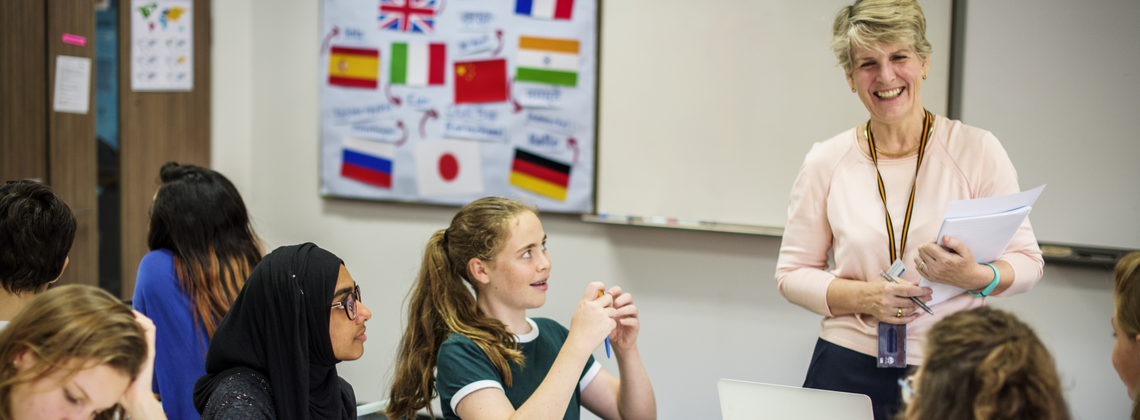

Chances are, reading is something you enjoy doing in your native language without even thinking about it. It’s probably something you do to relax – immersing yourself in fictional worlds or educating yourself about strange new ideas. Books can be a source of great inspiration for the language learner too – learning to read for pleasure in a foreign language can swiftly advance your skills in other areas, such as speaking.
But where to start? Opening the first Spanish novel you see or attempting to tackle some of France’s greatest works of literature can be intimidating…so many words you don’t understand! Hundreds of pages of vocabulary to plough through – how will this ever be enjoyable?!
But don’t panic, FlashAcademy® are here to help, with 5 winning tips for reading in a foreign language that’ll take you from zero to hero quicker than you can say ‘Don Quixote’…

Use context
Instead of reaching automatically for the dictionary when you encounter new words, have a go at guessing the meaning of unknown vocabulary from the rest of the sentence or paragraph. Read the offending section many times over, then branch out to the surrounding area. What’s going on? What could this word mean? This is how you learnt your native language as a baby, and it’s a more successful technique than you might think. The process of guessing and checking later not only makes the reading experience more enjoyable, but the learning process more effective. You’re more likely to recall words you’ve actively figured out yourself than ones you’ve passively looked up in a dictionary.
Focused vs. relaxed reading
All learning should include a variety of methods to ensure that your motivation levels stay high. Split your time between ‘hardcore’ reading – with a dictionary, making notes, underlining and researching – and ‘relaxed’ reading, which means reading as much as you can and choosing easier books that you’re more interested in. With the latter, read for the ‘gist‘ instead of trying to understand every word. Comic books are another great source of practice – it might feel like cheating, but here at FlashAcademy we believe that above all, languages should be fun! The combination of images and words makes it easier and more enjoyable to figure out what’s going on.
Don’t try to understand everything
When learning any language, it’s tempting to want to be 100% perfect, 100% of the time. However, whether speaking to a local in a shop or reading a newspaper article, you probably won’t understand everything that’s being said – and that’s OK. Strive to challenge yourself but don’t beat yourself up if you don’t completely understand. So what if you don’t recognise a particular expression, verb form or idiom when you read?! It’s more important that you’re having fun and progressing. If the stumbling block is something that is impeding any comprehension whatsoever, then by all means look it up. But in general, constantly stopping and starting when you read will only put you off language learning forever…

Read at the correct level
The purpose of reading is to enjoy the text for what it is. If you’re a beginner trying to tackle War and Peace then you’re going to run away screaming and never look at a Russian text again. Choose books that are suitable for your learning level. The sweet spot is something that’s not too comfortable: it feels like a bit of a stretch, but you can more or less pick up what’s happening with a bit of concentration. Anything too easy might be fun, but it won’t help your language learning. Anything too hard might actually be counter-productive if there’s too much information for you to process and remember.
Re-read
Great – you’ve ploughed through a text, you’re feeling pretty happy with yourself and you’re going to reward all that hard work with a Netflix binge or an afternoon nap. Not so fast! There’s plenty more you can do with books to make sure you get the most out of them. Re-read the text: do you still understand everything? Can you explain it to someone else? Were your contextual guesses correct? Could you note down any new, useful words? Could you re-read the text aloud to practice pronunciation? Could you read it with a timer to improve speed? Doing this will make you an effective independent learner with a treasure trove of language hacks at their fingertips.
If after all that you still feel intimidated, then how about this: research has shown that English-speaking children take twice as long to learn to read as children who speak most other European languages, largely because of the vagaries of English spelling and irregularities of grammar. So the very fact you’re reading this in English means you’re already a reading prodigy! Remember though, reading is just one part of the process. You won’t master a language through reading alone. Mix up your reading practice with a healthy dose of authentic listening material, grammar lessons, vocabulary revision and actually speaking the language and you’ll be on track for language success!

